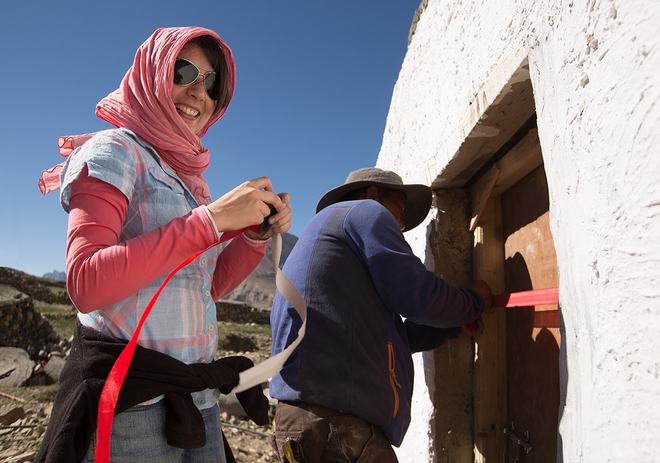Swati Rai
A lover of mountains, 37-year-old Ishita Khanna of Spiti Ecosphere, spends seven to eight months in the beautiful Spiti valley of Himachal Pradesh to contribute towards ecology and economy of the region. Armed with a Masters degree in Social Work, she co-founded the NGO Spiti Ecosphere to primarily promote eco-tourism. At the same time, the NGO’s agenda is providing employment to the local population, while giving equal importance to conservation and sustainable development in the region.
Working in the Spiti valley is certainly not an easy task. Communicating outside the region is a big challenge, so is working without electricity. It is difficult for them to find volunteers. “Not everybody has the courage to work in adverse conditions. Lack of road safety and funds are issues we have to deal with every now and then,” says Ishita of Dehradun, who started working in 2006, under the aegis of her NGO Muse.
“We use local resources, people and regional bounties to conserve and protect the environment. We involve people in projects like building green homes, responsible eco-travel, setting-up renewable energy resources and also promoting and reviving local art forms.”
Members of Ecosphere have been constructing greenhouses to grow vegetables in the harsh winter months. They have also helped build solar-passive houses to reduce the use of wood as a fuel, thereby reducing carbon-emission levels. Ecospheres’ range of sea buckthorn products sold under the brand name, Tsering — a blessing for long life, help raise the funds.
Eco-tourism is one of their main concerns. As Ishita says, “Tourism gives a boost to the economy but at the cost of ecological balance.” There is no stringent policy on the issue of degradation of local environment. Authorities are only bothered about influx of tourists in the mountains as it helps strengthen economy.
Spiti Ecosphere has chalked out engagement programmes for tourists that are inclusive in nature and profitable for the locals too. Apart from cultural and Buddhist trails, Ecosphere facilitates homestays and wildlife trips. This is not all, the NGO has also ventured into the area of presenting the lesser-known geographical strength of the region — botanical tours and fossil excursions.
At a time when Living Planet Report 2014 released by WWF has concluded that humanity’s demand on the planet is 50 per cent more than what nature can renew, Spiti Ecosphere is determined to undertake all tourist activities with an aim to reduce the carbon footprint.
Another term coined by the NGO members is Voluntours. It directly engages travel with conservation. Ishita adds, “By staying at a local house, tourists contribute 30 to 50 per cent of annual incomes of local persons. It’s now an supplemental source of income in the face of increasing climatic changes affecting agricultural patterns and crop yields.” Homestays in Spiti were started by Ecosphere in 2004. The process has also helped conserve traditional architecture and cultural heritage.
Part of the campaign is an annual programme called, The Spiti Kaleidoscope. It starts from August 30 to promote a journey that merges conservation, sustainable development and holistic travel.
Talking about her mission Ishita says, “The work is in progress, but I am happy that we have been able to involve the local community in whatever we do.” She adds that if it wasn’t for the support of her family, the journey would have been difficult. She is happy to follow her dream and she knows it slowly is coming true.
Unlock Exclusive Insights with The Tribune Premium
Take your experience further with Premium access.
Thought-provoking Opinions, Expert Analysis, In-depth Insights and other Member Only Benefits
Already a Member? Sign In Now










